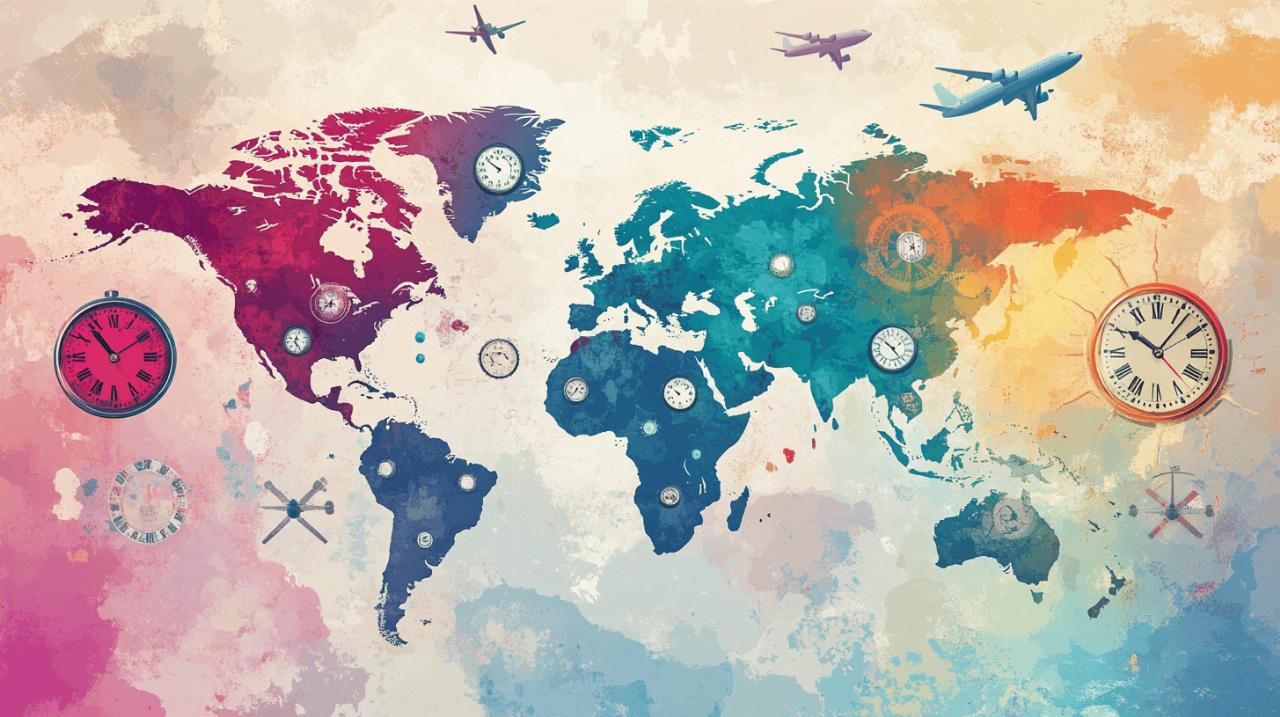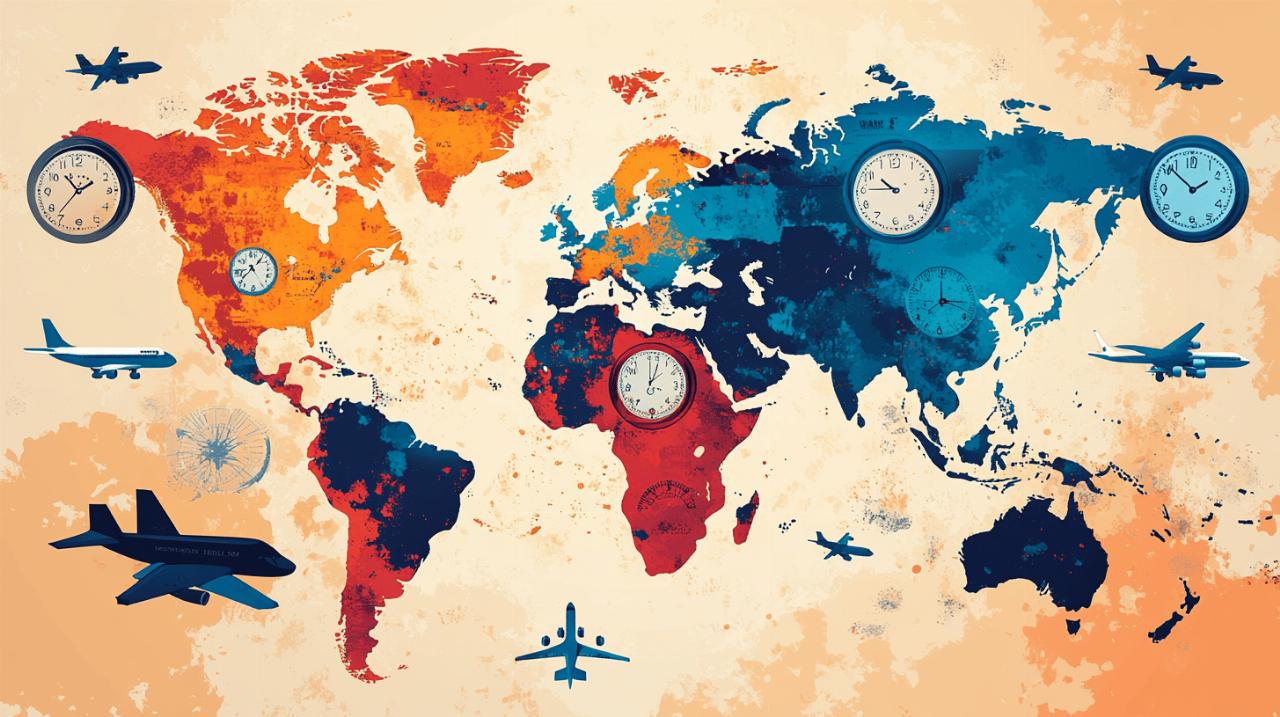Understanding Jet Lag: The Time Difference Between Cameroon and the Rest of the World and How It Affects Travellers
Jet lag is a common traveller's complaint that affects millions of people crossing time zones each year. This temporary sleep disorder can turn an exciting journey into a challenging experience as your body struggles to adjust to a new schedule. For travellers heading to Cameroon or leaving the West African nation, understanding the time differences and how they impact your body can make all the difference between a smooth transition and days of fatigue.
The basics of cameroon's time zone
Time zones serve as the fundamental framework for coordinating global activities across different regions. They help manage the sun's movements across the globe and ensure that noon corresponds roughly to when the sun is highest in the sky. Without this system, international travel and communication would be chaotic at best.
GMT+1: Cameroon's Position in the Global Clock
Cameroon operates on Greenwich Mean Time plus one hour, commonly written as GMT+1. This places the country in the West Africa Time zone, sharing the same time with several neighbouring nations. This time zone positioning means that Cameroon experiences daylight and darkness at different times than many major global cities, which can trigger jet lag when travelling there from distant locations. The one-hour offset from GMT creates a consistent reference point for travellers to calculate time differences when planning their journeys to this Central African nation.
Yaoundé as a Reference Point for Cameroon Time
When determining the exact time in Cameroon, Yaoundé serves as the primary reference point. As the capital city, Yaoundé represents the standard time throughout the country. Unlike some larger nations that span multiple time zones, Cameroon maintains a single time zone across its entire territory, which simplifies travel planning within the country. This consistency means that whether you land in Douala, visit the coastal areas, or venture into the northern regions, you will not need to adjust your watch once you have set it to Cameroon time.
Cameroon's Time Relationship with the UK
For British travellers, understanding the time relationship between the UK and Cameroon is particularly relevant. This relationship fluctuates throughout the year due to daylight saving time practices, which can affect everything from flight scheduling to business calls between the two nations.
Winter vs summer time differences
During the winter months in the UK, Cameroon sits just one hour ahead of British time. This relatively minor time difference means that travellers from the UK to Cameroon during winter months experience minimal jet lag compared to journeys to destinations further east or west. The circadian rhythm, which regulates our sleep patterns and bodily functions, can adjust relatively quickly to a single hour shift, often within a day or two. However, even this small difference can cause sleep disruption for sensitive travellers or those with existing sleep difficulties.
The Impact of Daylight Saving Time on the UK-Cameroon Time Gap
The time relationship between the UK and Cameroon becomes even more interesting during the British summer months. When the UK shifts to British Summer Time and moves its clocks forward by one hour, it effectively eliminates the time difference with Cameroon altogether. During this period, London and Yaoundé operate on identical time, which can be quite convenient for business communications and travel planning. This synchronization means that summer travellers between the two countries might avoid jet lag entirely, as their body clocks need not adjust to any time difference.
Global time differences and travel planning
When travelling internationally, understanding global time differences becomes crucial for effective journey planning. The further east or west you travel from Cameroon, the greater the time difference and potential impact on your body clock.
How time zones affect long-haul flight scheduling
Time zones significantly influence flight scheduling, particularly for long-haul journeys to or from Cameroon. Airlines must account for these differences when planning departure and arrival times, often scheduling flights to arrive at convenient local times despite potentially inconvenient departure times. For example, flights from Europe to Cameroon might be scheduled to arrive in the afternoon or early evening local time, allowing passengers to have dinner and go to bed at a reasonable hour, which can help mitigate jet lag symptoms. The direction of travel also matters significantly; flights from Cameroon heading east will often result in more severe jet lag than those heading west, as eastward travel requires our bodies to advance their circadian rhythms, which is more challenging than delaying them.
Calculating Time Differences for Your Journey to Cameroon
When planning travel to Cameroon, calculating the precise time difference from your location helps you prepare for potential jet lag. From the eastern United States, Cameroon is typically 5-6 hours ahead, creating a moderate time difference that can cause noticeable jet lag. Travellers from Asia face even greater challenges, with time differences that can exceed 8 hours, potentially causing severe circadian rhythm disruption. Knowing these differences in advance allows travellers to implement pre-travel adjustment strategies, such as gradually shifting sleep schedules before departure to align more closely with Cameroon time.
Managing jet lag when travelling to cameroon
Jet lag occurs when your body clock does not match the local time zone, causing a range of uncomfortable symptoms. For journeys to Cameroon, particularly those crossing multiple time zones, managing this condition becomes an important aspect of travel planning.
The body clock's response to west african time shifts
Our internal body clock, or circadian rhythm, governs numerous physiological processes including sleep-wake cycles, hormone release, and digestive functions. When travelling to Cameroon across time zones, this finely-tuned system becomes disrupted. The severity of symptoms correlates directly with the number of time zones crossed, with journeys spanning more than three time zones typically causing more pronounced effects. Common symptoms include fatigue, insomnia, digestive issues, headaches, and concentration difficulties. These effects tend to be more severe when travelling eastward to Cameroon, as advancing your body clock is more challenging than delaying it when heading west.
Practical Tips for Adjusting to Cameroon Time
Several strategies can help minimize jet lag when travelling to Cameroon. Begin adjusting your sleep schedule before departure by going to bed earlier if travelling east or later if heading west. During your flight, stay hydrated by drinking plenty of water while avoiding alcohol and limiting caffeine. Try to sleep on the plane if it aligns with nighttime at your destination. Once you arrive in Cameroon, expose yourself to natural sunlight during daylight hours, which helps reset your body clock. Adapt to local meal times immediately, eating smaller portions to aid digestion. Short naps of 15-20 minutes can help combat daytime fatigue without disrupting nighttime sleep. Melatonin supplements might help some travellers, though medical advice should be sought before use. With proper preparation and care, most travellers can adjust to Cameroon time within a few days and fully enjoy their West African adventure.
The science behind jet lag and circadian disruption
Jet lag is a temporary sleep disorder that occurs when travelling across multiple time zones, such as when flying from the UK to Cameroon. This happens because your body clock (or circadian rhythm) becomes misaligned with the local time at your destination. Cameroon operates on GMT+1, meaning it's one hour ahead of London during winter months, while during British summer time, both countries share the same time zone.
Your body naturally regulates sleep, wakefulness, hunger, and other physiological processes based on a roughly 24-hour cycle. When you rapidly cross time zones, these internal rhythms struggle to adapt to the new external cues, particularly sunlight exposure, causing a range of uncomfortable symptoms.
How east-west travel affects your circadian rhythm
The direction of travel significantly impacts how your body responds to time zone changes. Flying between the UK and Cameroon involves primarily north-south movement with minimal time difference, but many travellers connect through other countries, creating more complex time zone shifts.
Travel direction matters considerably – flying west (where you gain time) is typically easier for your body to handle than flying east (where you lose time). This is because it's easier for most people to stay up later than to force themselves to sleep earlier. When travelling east, your body must compress its natural cycle, which is more challenging than the extension required when travelling west.
For each time zone crossed, your body typically needs about one day to adjust fully. Sunlight exposure plays a crucial role in this adjustment, as light is the primary signal that helps reset your body clock. Getting morning sunlight when travelling east or evening sunlight when travelling west can help speed up adaptation to the new time zone.
Sleep Disruption and Fatigue: Common Symptoms When Flying to Cameroon
When travelling to Cameroon, you might experience various jet lag symptoms even with the relatively small time difference. These typically include sleep disruption, ranging from insomnia at night to overwhelming sleepiness during the day. Many travellers report persistent fatigue that can undermine holiday or business plans.
Beyond sleep issues, you may experience headaches, difficulty concentrating, and digestive problems including constipation or diarrhoea. Some travellers also notice mood changes, becoming more irritable or anxious than usual. These symptoms tend to be worse if you're dehydrated, stressed, or have consumed alcohol or caffeine during your journey.
The severity of these symptoms can vary based on several factors. Older travellers (particularly those over 60) often find recovery takes longer. Your overall health, stress levels, and sleep quality before travel also play significant roles. The cramped conditions and low humidity of aircraft cabins can exacerbate fatigue and dehydration, making symptoms worse upon arrival.
While jet lag typically resolves within a few days as your body clock adjusts to local time, proper preparation can minimise its impact. Staying well-hydrated, gradually shifting your sleep schedule before departure, and getting appropriate sunlight exposure upon arrival can help your body adapt more quickly to Cameroon time.
